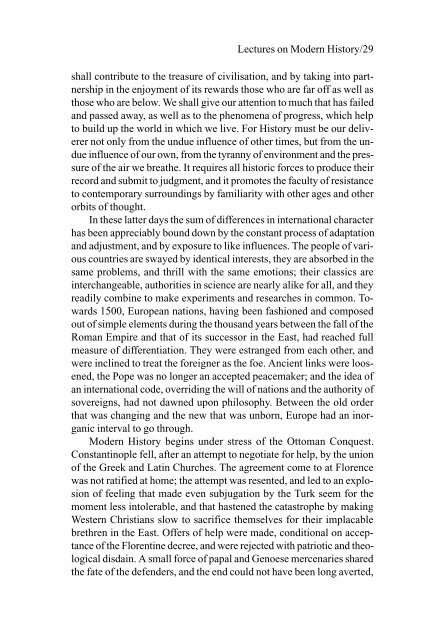Lectures on Modern History - Faculty of Social Sciences
Lectures on Modern History - Faculty of Social Sciences
Lectures on Modern History - Faculty of Social Sciences
You also want an ePaper? Increase the reach of your titles
YUMPU automatically turns print PDFs into web optimized ePapers that Google loves.
<str<strong>on</strong>g>Lectures</str<strong>on</strong>g> <strong>on</strong> <strong>Modern</strong> <strong>History</strong>/29shall c<strong>on</strong>tribute to the treasure <strong>of</strong> civilisati<strong>on</strong>, and by taking into partnershipin the enjoyment <strong>of</strong> its rewards those who are far <strong>of</strong>f as well asthose who are below. We shall give our attenti<strong>on</strong> to much that has failedand passed away, as well as to the phenomena <strong>of</strong> progress, which helpto build up the world in which we live. For <strong>History</strong> must be our deliverernot <strong>on</strong>ly from the undue influence <strong>of</strong> other times, but from the undueinfluence <strong>of</strong> our own, from the tyranny <strong>of</strong> envir<strong>on</strong>ment and the pressure<strong>of</strong> the air we breathe. It requires all historic forces to produce theirrecord and submit to judgment, and it promotes the faculty <strong>of</strong> resistanceto c<strong>on</strong>temporary surroundings by familiarity with other ages and otherorbits <strong>of</strong> thought.In these latter days the sum <strong>of</strong> differences in internati<strong>on</strong>al characterhas been appreciably bound down by the c<strong>on</strong>stant process <strong>of</strong> adaptati<strong>on</strong>and adjustment, and by exposure to like influences. The people <strong>of</strong> variouscountries are swayed by identical interests, they are absorbed in thesame problems, and thrill with the same emoti<strong>on</strong>s; their classics areinterchangeable, authorities in science are nearly alike for all, and theyreadily combine to make experiments and researches in comm<strong>on</strong>. Towards1500, European nati<strong>on</strong>s, having been fashi<strong>on</strong>ed and composedout <strong>of</strong> simple elements during the thousand years between the fall <strong>of</strong> theRoman Empire and that <strong>of</strong> its successor in the East, had reached fullmeasure <strong>of</strong> differentiati<strong>on</strong>. They were estranged from each other, andwere inclined to treat the foreigner as the foe. Ancient links were loosened,the Pope was no l<strong>on</strong>ger an accepted peacemaker; and the idea <strong>of</strong>an internati<strong>on</strong>al code, overriding the will <strong>of</strong> nati<strong>on</strong>s and the authority <strong>of</strong>sovereigns, had not dawned up<strong>on</strong> philosophy. Between the old orderthat was changing and the new that was unborn, Europe had an inorganicinterval to go through.<strong>Modern</strong> <strong>History</strong> begins under stress <strong>of</strong> the Ottoman C<strong>on</strong>quest.C<strong>on</strong>stantinople fell, after an attempt to negotiate for help, by the uni<strong>on</strong><strong>of</strong> the Greek and Latin Churches. The agreement come to at Florencewas not ratified at home; the attempt was resented, and led to an explosi<strong>on</strong><strong>of</strong> feeling that made even subjugati<strong>on</strong> by the Turk seem for themoment less intolerable, and that hastened the catastrophe by makingWestern Christians slow to sacrifice themselves for their implacablebrethren in the East. Offers <strong>of</strong> help were made, c<strong>on</strong>diti<strong>on</strong>al <strong>on</strong> acceptance<strong>of</strong> the Florentine decree, and were rejected with patriotic and theologicaldisdain. A small force <strong>of</strong> papal and Genoese mercenaries sharedthe fate <strong>of</strong> the defenders, and the end could not have been l<strong>on</strong>g averted,
















